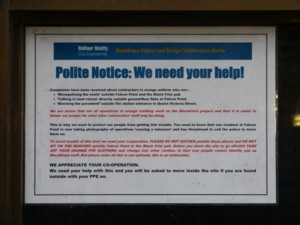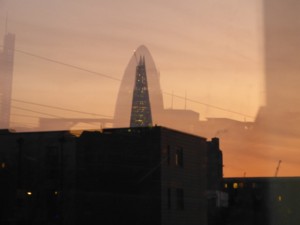We are developing the social individualist meta-context for the future. From the very serious to the extremely frivolous... lets see what is on the mind of the Samizdata people.
Samizdata, derived from Samizdat /n. - a system of clandestine publication of banned literature in the USSR [Russ.,= self-publishing house]
|
“Don’t vote Green until they drop the anti-science zealotry”, says Tom Chivers of the Telegraph.
Well, obviously. The first three words would have sufficed. It is not that I disagree in the slightest with the thrust of Mr Chivers’ article – he rightly condemns a Green Party plan, now apparently dropped, to have some sort of mass vandalism party directed against an experimental crop of GM wheat. Ironically, but not surprisingly, the point of the experiment was to try and produce a type of wheat less reliant on pesticides. That the Greens are Luddites should surprise no one. It did surprise me that it surprised Mr Chivers. How does one get to be assistant comment editor of the Telegraph? I would have thought that the knowledge of political affairs required to qualify for that post would disqualify one from being able to write, other than as a joke, the following:
I actually like the Green Party. My dad used to be, and may still be, a member. They’re well-meaning and many of them share my taste for unkempt beards. I think I put Jenny Jones as my first choice in the London mayoral elections.
But the trouble is that they’re scientifically illiterate and have what seems to be a fear of technological process.
In other news, Queen Anne’s dead.
Mr Chivers shared his Platonic cave with Mr George Monbiot of the Guardian. He has recently noticed that Noam Chomsky and John Pilger are quite happy to flirt with genocide denial so long as the deniers oppose the United States.
One of the little pleasures of my life is looking back through old photo-archives and finding pictures that particularly amuse, in ways that I did register when taking them (otherwise I would not have taken them), but then forgot about.
So this morning, for instance, while looking through some pictures I took earlier in the month of the remarkable (because so remarkably ugly) Baynard House, I came across this picture:
Yes, it is ugly, isn’t it? But what interested me when I took that photo was also all those Men in Orange. What were they up to? What struck me at the time, and I distinctly remember this feeling now, was what an alarmingly large number of Men In Orange there were. It was like they were making an action movie and about to be slaughtered by James Bond or by a James Bond imitator, or perhaps even plotting an urban atrocity of some sort themselves, for real. None of the photos I took of these many, many Men In Orange quite captures the scary oddity of them, congregated in such an alarmingly large number. The above snap was only the least unsuccessful from this point of view.
So it was that, when I encountered this sign on the side of Baynard House a few moments later, I was amused, and not wholly surprised:
Click to make that more legible.
What the Men In Orange are doing is some major rearranging of Blackfriars tube station. Blackfriars Station as a whole, including an overground railway station that straddles the Thames on Blackfriars Bridge, is being entirely reconstructed, and the underground bit with it. (I show a couple more shots of the overground aspect of all this activity here.) Merely the London Underground (LU) aspect of this is a big job, which requires the attentions of Men In Orange in large numbers.
The above snaps were taken when I was on my way to One New Change. The process of writing about One New Change caused me to forget my strange encounter with the Men In Orange, until prompted to remember the experience this morning, thanks to the magic of digital photography and the infinitely capacious hard drives that computers have in them nowadays.
Along with variations such as “The lying will continue until trust improves”, this jokey phrase is, alas, a completely accurate description of what many of our most lauded and influential thinkers believe is the best way for them and their class to motivate those less lauded and influential.
Guy Lodge is associate director at the Institute for Public Policy Research and a Gwilym Gibbon Fellow at Nuffield College, Oxford. He writes:
Bad weather in parts of the country will no doubt have played a role in keeping some voters at home, but clearly this doesn’t account for the worrying levels of political disaffection reflected in the low numbers choosing to vote.
His cure for political disaffection?
This cycle can only be broken by radical means. IPPR research shows that the best way to boost political participation among “hard-to-reach” groups is to make voting compulsory.
The Ministry of Defense wants to put surface to air missiles in residential areas as part of security measures for the Olympics. This is highly irregular. They are to be used against…
…all manner of airborne attacks from the 9/11 style assault to a smaller “low and slow” attack from a single light aircraft.
I would be surprised to see hijacked airliners ever again. A light aircraft attack sounds plausible, but shot down aircraft wreckage landing on London might still be considered a win for the terrorist.
There are also to be army troops, fighter jets and naval ships at the ready. The MOD are certainly preparing for more than a kid with a bomb strapped to his chest.
From the Radio Times, about a programme this evening on BBC3 TV, entitled I Woke Up Gay:
Documentary about Chris Birch, who used to be a rugby-playing lad with a girlfriend and a job in a bank. However, his life was radically changed by a stroke when he was just 21, and he is now a gay hairdresser with an interest in fashion and interior décor.
The question I ask with my title is of course an attempt to get a smile, if not a lol, but it is also serious. Has anyone gay suffered a stroke and emerged from it straight, with the overwhelming desire to ditch the hairdressing and instead to get a girlfriend and a job in a bank and to take up rugby? Either way, I think the answer would be interesting. Seriously, is this kind of thing a one way street, or can it work in both directions?
Neither answer would obey the gods of Political Correctness. If a stroke can turn you gay, but not make you straight, that would suggest that gays are, at least in some sense, the result of something a lot like brain damage. They are, sort of, a mistake. If a stroke can turn you straight, then maybe those crazy Christians who say that they can straighten out gays may after all be onto something.
A relative of mine recently had a stroke. He lost his peripheral vision and can no longer drive, but otherwise no change. Still no interest in fashion, or not that anyone in the family has heard about.
All this reminds me of that Woody Allen movie (I can’t recall which – they’re all a blur) where someone gets a smack on the head and wakes up right wing.
I entirely realise that strokes are frequently very unfunny. I’m sure we all know about friends or relatives who were not as lucky as my relative, or as Chris Birch was, kind of. I certainly do.
The programme airs at 9pm, and is repeated at 12.30pm in the very small hours of tomorrow morning. I will record it.
Indeed. I’m watching it on telly now. Someone, a youngish man by the look of him, swam across the course, in front of the boats, and both boats had to stop. They will have a restart, at the approximate point where the race was interrupted. Which will turn the event into two sprints laid end to end, instead of something more like a middle distance event.
The commentators are saying that it was some kind of demo. They are now showing the bloke narrowly missing being decapitated by the oars of one of the boats. It seemed like a very deliberate disruption. They are calling him “a protester”, and they are now reporting that he “has a big smile on his face”, and that he has clearly accomplished what he wanted.
So what do you suppose he was on about? Any bets? Maybe in times gone by, the message being pushed by this demo, if message there was, could have been entirely suppressed by the powers that be, in the event that they wanted it suppressed. These days, no chance.
This is not something that usually happens in the Boat Race. (Yes, yes, there are indeed many other boat races. This one is the Boat Race.) “This has never happened before in the Boat Race”, says an expert talking head.
The race will soon start again. At the time the race was interrupted, the two boats were both very close together. Oxford were apparently heavy favourites at the start. Now, not so much. It was turning into a very good race. How will this affect the result, and be judged to have affected it?
The Boat Race is usually, frankly, a very dull affair, or so I think. Often the race is won and lost within the first half a minute, and the rest of it is a tedious procession. This kind of thing livens it up, in many eyes.
But best of all is when the finish is, as is extremely rare, very close. This one could still end like that, but it’s very unlikely.
I see that in that earlier piece, dated 2003, I wrote this:
I overheard another interesting titbit in among the preparatory waffling. Apparently 90% of these oarsmen go into “banking”, by which I think they meant “merchant” banking. I don’t know what this proves. It could be that rowing is a fine preparation for financial titans. Or it could be that the financial services industry contains a lot of people with more ex-brawn than current brain. A bit of both, I should guess. They don’t get paid anything to be in this race, but it seems that they clean up afterwards. Investment in networking. Speculate to accumulate. Apparently they were racing for the “Aberdeen Asset Management Trophy”. It figures.
So this latest little drama is the kind of thing that Instapundit flags up under the heading of: “metaphor alert”.
And: they’re off!
Again.
Oh my god! An Oxford rower has lost the whole end of his oar. It’s just a stick! The race continues, because the umpire reckons it was Oxford’s fault, following a clash of oars. It’s a procession. Another metaphor alert! The sure fire winner is now doomed!
If you care, this is all terrible. But for me it’s more a case of LOL. Whether that’s right is an argument, but that, for me, is how it was.
This comment, from “James R”, made me laugh, in fact it made me LOL:
We need to avoid conflagrating copyright with patents.
If enough people say that confragrating conflagrating and conflating mean the same thing, then they do. But, I hope that isn’t what gets decided.
This comment was attached to a piece by Tom Burroughes about intellectual property, about which Tom will be speaking, at an event organised by Libertarian Home this evening, in Southwark. I hope to be there myself.
LATER: Oh dear. Another correction is required. The piece I linked to is not by tonight’s speaker Tom Burroughes, but by Libertarian Home’s Simon Gibbs. Apologies to both persons.
Things seem to be a bit quiet here this weekend, so here’s a picture I took earlier this evening:
Click to get it bigger.
This is not Photoshopped. That’s exactly what came out of my camera when I got home.
What it is is a picture of the Shard, taken by me from the front seat of a D(ocklands) L(ight) R(ailway) automated train, as the train approached its central London terminus, which is near to the Tower of London.
Taking photos through train windows is, as all photographers know, fraught with peril, because of all those stupid reflections in the glass of the window that you inevitably get, of such things as lights inside the train. But this time, what was reflected in the window was a tower on the other side of the train, namely the Gherkin. And since the train was going very slowly at the time, I was able to line the two towers up with each other.
Well, I like it.
I’m single and have no children and I would love to meet someone – but looking like Kim Jong-il doesn’t help.
– William Cheong, 43, a plumber who lives in Acton, West London.

Matheran, India. March 2012
Except there were two horses. Oh no. It couldn’t be, surely?
→ Continue reading: The two horses of the apocalypse
Do you ever find the structure of a situation in the news fascinating in its own right, as you would the plot of a novel, almost irrespective of how it pans out in the real world?
Some documents were tricked or leaked out of an anti global warming thinktank, the Heartland Institute. Most of these documents have been admitted to be genuine, and while opinions differ as to how shocking they are, they were certainly not stuff that the Heartland Institute had wished to share with the world. So far the tables are turned on the the Climategate affair.
Only…
The juiciest document, the one that had the really damning quotes (it spoke of “dissuading teachers from teaching science”) is different from all the others. Megan McArdle, not herself in the sceptic camp, says it is looking faker by the minute.
If it does turn out that it is a fake, then the tables are turned on the table turners. But… but… why would anyone be so daft? Having pulled off the trick, got the goods, why put your gains at risk for such a trivial advantage as that of providing a quotable summary?
One of the reasons for the veracity of this particular document being in doubt is that it is sloppy. It contains errors of fact and is written in an unprofessional style. Still, that happens sometimes. “Organisation Contains Sloppy Writer” is not exactly a headline to make them hold the front page. Maybe the sloppiness is a reason to suppose it genuine. But let us run with it being fake for a while – was the faker in a hurry for some reason? It reminds me (and a lot of people) of the Rathergate memos. What a daft error it was to publish them in the default Microsoft Word font of 2004 when they were meant to have originated in the 1970s. I thought then and still think now that they were a first draft released too soon. Could something similar have happened here?
The Guardian pulls in its horns a little. Its story now carries a rather grudging little update saying that the Heartland Institute now claims one document is a fake. The Guardian does not make it as clear as it ought in my opinion that the doubtful document is the very one that had all the good quotes.
At this point, like all good detective stories, a whole new sub plot bubbles up. The climate sceptic blogs have a suspect and name him with what seems to me ridiculous confidence given that the stated evidence against him is vague; mostly a matter of similarities of style. Now who’s risking all they have gained for a trivial advantage? If their suspect turns out to be wrongly accused, the story, which they had snatched back and made into one about fakers rather than leakers, will be forfeit again.
And so it goes – and so it stalls, last time I looked. The person named has not responded to emails; he appears to be offline. But why shouldn’t he be offline? Do you spend your Saturdays checking your email to see if you have been accused of any career-ending shenanigans in the last few hours? Meanwhile other strange portents are seen; open letters are published then retracted and both sides go about with an air of knowing more than they are letting on.
Agatha Christie would put in the second murder about now.
UPDATE, 21 FEBRUARY:
The second body duly falls.
That “person named” to whom I alluded so delicately was Peter Gleick. He has now admitted obtaining the documents by deception. I note that the very thing that led to his name being mentioned as a suspect were similarities of writing style between Gleick’s published writing and the “different” email. Nonetheless he claims that he did not alter any of the emails he obtained. As to that, here is a page listing 100 interjections of the sort that express emotion without actually pinning one down to having said anything. Choose as appropriate. I quite like “hmm” and “ahem” myself, but my favourite must be “uh-huh” (affirmation) differing by only a breath from “uh-uh” (negation).
Hat tip to Douglas2 in the comments.
They said it would never be agreed. Then they said it would never be launched. Then they said it would fail. When it was a success, the euro-haters still insisted that the single currency was a recipe for economic chaos and political instability. The phobes are proving to be wrong again. At a time when so much of Europe’s political leadership is in flux, the single currency is the steadying point in an uncertain and worrying world.
Imagine that the recent turbulence on the continent had occurred when Europe still traded in pre-euro currencies. What would have happened to the French franc when neo-fascist Jean-Marie Le Pen forced the Prime Minister to quit? The franc would have plunged. What would have happened to the Dutch guilder when an anti-immigration party with a dead leader impelled itself into government? The guilder would have plunged too. Before a German election too close to call, even the stolid old mark would be gyrating. And instability in currency markets would be fuelling even more political chaos: a vicious, downward cycle.
That this has not happened is thanks to the euro. The single currency has taken all this political upheaval in its calm stride.
– From an anonymous editorial in the Observer headed “A tolerant euro”.
From 2002, in case you were wondering.
|
Who Are We? The Samizdata people are a bunch of sinister and heavily armed globalist illuminati who seek to infect the entire world with the values of personal liberty and several property. Amongst our many crimes is a sense of humour and the intermittent use of British spelling.
We are also a varied group made up of social individualists, classical liberals, whigs, libertarians, extropians, futurists, ‘Porcupines’, Karl Popper fetishists, recovering neo-conservatives, crazed Ayn Rand worshipers, over-caffeinated Virginia Postrel devotees, witty Frédéric Bastiat wannabes, cypherpunks, minarchists, kritarchists and wild-eyed anarcho-capitalists from Britain, North America, Australia and Europe.
|







